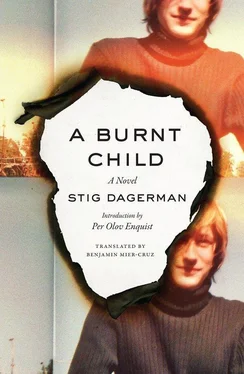Everything is natural and free of shame. A bit later, when they are at Bengt’s desk and leafing through his books like lovers do, Gun finds his letter to Berit. He has already sealed the envelope, but she doesn’t ask him to open it, just as he doesn’t reproach her for the time she locked herself in the cottage with his father. All she says about the letter is that he should send it and that he should write more letters more often. And they aren’t cynical when they tell each other, once again, that Berit is sweet and that they can’t hurt her. They are only considerate because their tenderness toward each other also makes them compassionate to others. As for Knut, they say that everything should go on as usual. Gun will continue to see him, will continue to let him love her, because it’s the only possible way if they are to go on loving each other. They speak calmly and without bitterness about Berit and Knut, two poor strangers who are not allowed to be hurt.
Later still, when the light is off and when the roar of the city sounds like the humming of a gigantic shell, they carry on whispering in the darkness about the future. They will meet seldom and in secret, but one time they will meet for a long time. In this future, there is nothing threatening, nothing that could not be dealt with, because through their calmness they have disarmed all dangers.
Perhaps all but one, and it’s her fault that they notice it. She suddenly lays her hand over his eyes as if there were something he wasn’t allowed to see in the dark and then whispers over his face:
I’m so afraid.
Of what? he whispers back.
That I’m too old for you.
Then her hand cools but only for a moment. He spreads the blanket over them along with all the thoughts he had during the loneliness of spring. Then he folds his hands around her back, as if protecting them both from all threats, and whispers:
I’ll make you young, just as young as I am. Now you’re just as young as I. Don’t you feel it?
She does feel it and then takes her hand away from his eyes. For a long time, she is just as young as he, and there is nothing silly about it. Only something beautiful.
But much later, no magic can help. They are not asleep, nor are they fully awake. Peaceful and relaxed with all desire dormant within them, and happy as one is when there isn’t anything more to ask for, they rest in each other’s arms—he on her right and she on his left. Then, suddenly, a car door slams on the street below. At first, they don’t grasp what it is, because they’ve forgotten all reality. This causes their fright to descend all the more rapidly, tearing them violently apart. And when he slightly opens the window shade, the magic is gone.
For the one leaning quite drunkenly on a taxi and searching his pockets for money with one of his tired hands is not a stranger named Knut. It is Bengt’s father, and this is why he shivers by the window. Not because he is naked, but because he has instantly discovered the truth. For a moment this discovery is so horrible that he wishes something dangerous would happen to the man down there. That he would fall flat on his face under the car just as it takes off. Then Bengt feels Gun’s nails digging into his chest. She was leaning over his shoulder, and he can tell from her nails that she also recognizes the man staggering on the sidewalk and waving his hand at a moving car. It’s not someone named Knut whom they hardly know. It’s a terrible man who is Bengt’s father as well as the lover of the woman Bengt loves, too.
This man bends down to pick up a coin on the sidewalk. Then he falls, of course, but he doesn’t stay down. As he slowly heads up to them, Gun swiftly gets dressed under the light of the lamp. And before Bengt turns the lamp off, they look at each other for a brief, shameful moment. Neither of them is particularly beautiful then because they are both flustered. He turns off the lamp just as the key begins fumbling after the lock. With her shoes in her hands, Gun crawls into his bed. He hides her securely underneath the blanket, pressing her as close to him as he can so that she will take up less space; he crumples the red dress in the same way. But the darkness and intimacy provide them some comfort, which allows them to endure it to some degree.
Otherwise what is happening is quite horrible and unbearable. They hear him fumbling about the entrance, trying to find the light, and almost in unison they whisper:
We haven’t forgotten anything, have we?
It’s a dreadful thought that they could have forgotten something, but they soon realize he’s too drunk to be able to notice anything anyway. As the father makes his way through the darkness with dragging steps and sudden outbursts of rage against everything he bumps into, they both try to remember that the doors to Bengt’s room are locked. Finally, they hear him find the daybed and thud into it, as if falling from a blow. After that, it’s silent for a while. Gun is no longer afraid, but she is crying. Nor is Bengt afraid, but he isn’t proud either. And he’s not at all pleased that his father has made her cry. If Knut had been a stranger, he could have been amused by it, but now he can only hate. He recognizes the hatred at once. It’s an old, familiar hatred, as firmly attached to him as his own ears. It’s the hatred he’s known almost his entire life—every time his mother cried on account of his father.
Once they hear him snoring, they jump up and turn on the light. Bengt slips Gun’s shoes back onto her feet and fastens the straps around her ankles. This time, when they look at each other they are genuinely beautiful again, and they kiss each other even more beautifully. When they are done, everything is almost as natural as before. He gives her Berit’s letter to put in the mailbox so that she will get it sooner. He unlocks the door, and they sneak hand in hand across the dark hallway. At the entrance, they kiss each other again, childishly long. Gun will call him. In the future she will always call, but they will only meet occasionally.
When he opens the shade, he sees her standing in the moonlight and waving to him from the other side of the street. He sees her lean far over the gutter, as if trying to reach him. Then she starts to walk away, going slowly past the butcher shop and all the other shops up the corner. Turning the corner is difficult when you are in love, but once she has done it, she isn’t truly gone. The light itself has taken on a reddish tinge from her dress. And when he pulls down the shade and turns around, the entire room is saturated with her. He flings himself on his bed and buries his face in his pillow. The pillow is saturated with her, too. His pillow will never be lonesome again.
After some time, he opens the door to the father’s room and goes inside. He turns on the ceiling light and tiptoes to the daybed. Then he kneels over the sleeping man and takes off his shoes. Without a sound, he sets them down on the floor and then loosens his collar. As he watches the slumbering face, he is struck by a tenderness so unexpected and so overwhelming that he puts his hands over the father’s face and caresses it. While caressing him, he is filled with an irrational joy. He gently peels off his father’s jacket and unbuttons his vest. He hangs the jacket on a hanger in the hallway and pulls out an overcoat. As he spreads the overcoat over his father, his eyes begin to cloud with tears. Then he sits on the floor next to the daybed, and with his father’s hand in his, he gazes up at the ceiling as he cries and cries with joy. Joy, because the room is filled with her and because the room is devoid of his mother. He doesn’t go back to his room until all of his tears are drained.
There, he immediately falls asleep and sleeps so deeply, dreamlessly, and peacefully, as one can only sleep when the unimaginable has happened. The night after discovering America, Columbus must have slept as he never slept before.
Читать дальше












